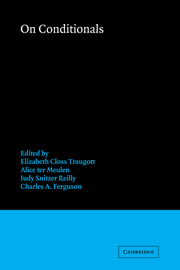Book contents
- Frontmatter
- Contents
- Contributors
- Preface
- Acknowledgments
- PART I GENERAL STUDIES
- PART II PARTICULAR STUDIES
- 5 ON THE INTERPRETATION OF ‘DONKEY’-SENTENCES
- 6 GENERIC INFORMATION, CONDITIONAL CONTEXTS AND CONSTRAINTS
- 7 DATA SEMANTICS AND THE PRAGMATICS OF INDICATIVE CONDITIONALS
- 8 REMARKS ON THE SEMANTICS AND PRAGMATICS OF CONDITIONALS
- 9 THE USE OF CONDITIONALS IN INDUCEMENTS AND DETERRENTS
- 10 CONDITIONALS AND SPEECH ACTS
- 11 CONSTRAINTS ON THE FORM AND MEANING OF THE PROTASIS
- 12 CONDITIONALS, CONCESSIVE CONDITIONALS AND CONCESSIVES: AREAS OF CONTRAST, OVERLAP AND NEUTRALIZATION
- 13 THE REALIS–IRREALIS CONTINUUM IN THE CLASSICAL GREEK CONDITIONAL
- 14 THE HISTORICAL DEVELOPMENT OF si-CLAUSES IN ROMANCE
- 15 FIRST STEPS IN ACQUIRING CONDITIONALS
- 16 THE ACQUISITION OF TEMPORALS AND CONDITIONALS
- 17 CONDITIONALS ARE DISCOURSE-BOUND
- 18 CONDITIONALS IN DISCOURSE: A TEXT-BASED STUDY FROM ENGLISH
- Index of names
- Index of languages
- Index of subjects
17 - CONDITIONALS ARE DISCOURSE-BOUND
Published online by Cambridge University Press: 04 August 2010
- Frontmatter
- Contents
- Contributors
- Preface
- Acknowledgments
- PART I GENERAL STUDIES
- PART II PARTICULAR STUDIES
- 5 ON THE INTERPRETATION OF ‘DONKEY’-SENTENCES
- 6 GENERIC INFORMATION, CONDITIONAL CONTEXTS AND CONSTRAINTS
- 7 DATA SEMANTICS AND THE PRAGMATICS OF INDICATIVE CONDITIONALS
- 8 REMARKS ON THE SEMANTICS AND PRAGMATICS OF CONDITIONALS
- 9 THE USE OF CONDITIONALS IN INDUCEMENTS AND DETERRENTS
- 10 CONDITIONALS AND SPEECH ACTS
- 11 CONSTRAINTS ON THE FORM AND MEANING OF THE PROTASIS
- 12 CONDITIONALS, CONCESSIVE CONDITIONALS AND CONCESSIVES: AREAS OF CONTRAST, OVERLAP AND NEUTRALIZATION
- 13 THE REALIS–IRREALIS CONTINUUM IN THE CLASSICAL GREEK CONDITIONAL
- 14 THE HISTORICAL DEVELOPMENT OF si-CLAUSES IN ROMANCE
- 15 FIRST STEPS IN ACQUIRING CONDITIONALS
- 16 THE ACQUISITION OF TEMPORALS AND CONDITIONALS
- 17 CONDITIONALS ARE DISCOURSE-BOUND
- 18 CONDITIONALS IN DISCOURSE: A TEXT-BASED STUDY FROM ENGLISH
- Index of names
- Index of languages
- Index of subjects
Summary
Editors' note. Akatsuka argues against a truth-conditional perspective in favour of a linguistic, specifically a pragmatic, approach. Using Japanese, English and some German data, she shows that we must consider discourse context as well as the speaker's attitude and prior knowledge to account for the semantics of conditionals. Conditionals in context are also the focus of Ford and Thompson's chapter; attitudes and beliefs are discussed by Adams, Barwise, and Fillenbaum. Akatsuka also suggests a ‘core’ meaning for conditionals that may or may not be morphologically defined, providing a link to the various discussions of marking, and of the relation of conditionals to causals, concessives, and to temporals and other domains.
INTRODUCTION
What I want to show in this chapter is that conditionals do not belong to the static domain of mathematical logic, but to the dynamic domain of discourse where individuals with different belief systems confront each other now.
I will demonstrate that we must consider discourse factors in (i) the preceding context and (ii) the speaker's attitude; and also that there is a connection between p and q, that is, every construction with the meaning ‘if p, q’ shares an abstract, grammatical meaning similar to ‘correlation/correspondence between p and q’. The evidence will be developed as follows: section 2 will examine two types of English conditionals, both of which have generally been regarded as counterexamples to the ‘connection’ theory; section 3 will show that consideration of factors in (i) and (ii) leads us to distinguish information and knowledge; section 4 will show that this distinction leads us to reject Haiman's (1978) view that conditionals are givens; section 5 is a conclusion.
- Type
- Chapter
- Information
- On Conditionals , pp. 333 - 352Publisher: Cambridge University PressPrint publication year: 1986
- 18
- Cited by



